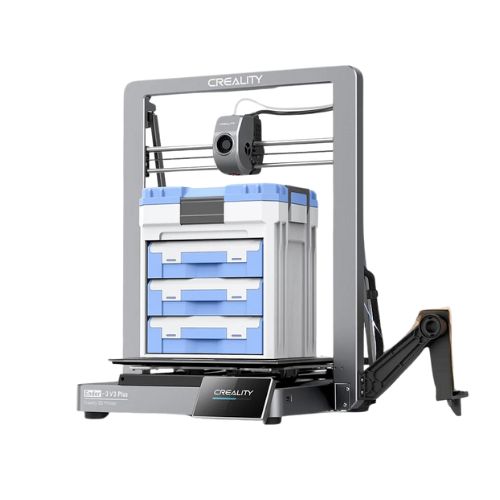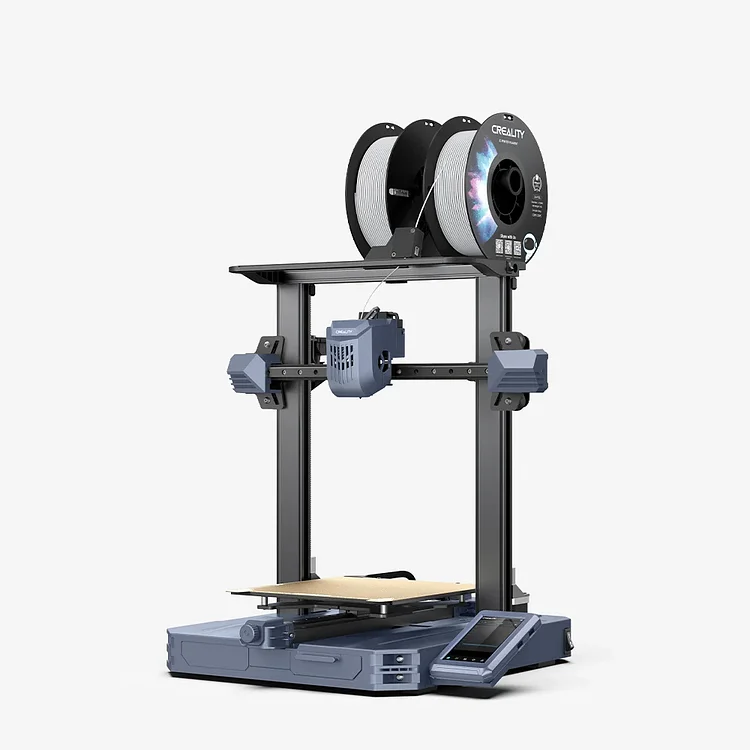Compare Ender 3 V3 Plus vs CR10 SE
Comparison between the best 3D printers
Choose the best 3D printer at the best price. The cheapest 3D printers are here.
Buy a 3D printer here with 3D Fila.
 |
 |
|
| Model | Ender 3 V3 Plus |
CR10 SE |
| Printing Material | Filament | Filament |
| Buy Filament for Creality Ender 3 V3 Plus | Buy Filament forCreality CR10 SE | |
| Estimated price | $479,00 | $386,00 |
| Manufacturer | Creality | Creality |
| Release Year | 2024 | 2023 |
| Print Volume [mm] | 300x300x330 | 220x220x265 |
| Printer Size [mm] | 410x445x577 | 490x470x625 |
| Weight [kg] | 11,5 | 6,9 |
| Power Loss Recovery | YES | NO |
| Enclosed printer | NO | NO |
| Bed Leveling | Automatic | |
| Filament End Sensor | YES | NO |
| Bed type | Heated | |
| Power supply system | Direct Drive | Direct Drive |
| Standard nozzle | 0,4 | 0,4 |
| Maximum Nozzle Temperature [°C] | 300 | 300 |
| Maximum Bed Temperature [°C] | 100 | 110 |
| Maximum printing speed [mm/s] | 600 | 600 |
| Filament holder | YES | YES |
| Camera for supervision | NO | NO |
| Recommended filaments | PLA, TPU(95A), PETG, ABS, PLA-CF, PETG-CF, CR-carbon | PLA, PETG, PET, TPU, PA Wood, ABS, ASA, PA, PLA-CF |
| Recommended slicers | Bambu Studio, Super Slicer, Cura, Prusa Slicer, Orca Slicer, Creality Print | Creality Print, Cura, Simplify3D, PrusaSlicer, Orca Slice |
| Maximum Resolution [mm] | 0,1 | 0,1 |
| Processor | ||
| Display | Touchscreen 4,3'' | |
| Power Supply | 350 W | |
| Connectivity | Wifi, Bambu bus, Cartão SD | USB, Wifi |
| Operating systems | Windows, Linux, Macbook | Windows, Linux, Macbook |
| Date of registration in the system | 2024-05-10 | 2024-07-02 |
| Release date | 2024 | 2023 |
| Extra features | The Ender 3 V3 Plus incorporates significant advancements in 3D printing, featuring a build volume of 300300330mm. It features a Creality operating system based on Klipper, which supports advanced functions such as linear advance and input shaping, and allows precise adjustments through root access or expert mode. The CoreXZ motion system allows a printing speed of up to 600mm/s, with an acceleration of up to 20000mm/s². Equipped with a flexible build plate and a quick-change nozzle with a hardened steel tip, the printer offers simplified maintenance and increased durability. Additionally, the high-speed direct drive technology of the extruder, together with an automatic leveling system and filament end sensors, raise the standard for reliability and efficiency. Compatible with a variety of filaments, including PLA and PETG, the Ender 3 V3 Plus is a robust choice for 3D printing enthusiasts and professionals. | The Creality CR10 SE stands out for its printing speed of up to 600 mm/s, easy and intuitive assembly, direct extruder with double gears, hotend with hardened steel nozzle and ceramic heater, automatic leveling with CR-Touch and pressure sensor, and use of Creality OS firmware based on Klipper, with automatic input shaping calibration. It also includes Wi-Fi connectivity, a filament out-of-stock sensor and a robust structure with linear rails on the X and Y axes. |
| Support for multiple colors and materials (AMS and CFS) | NO | NO |
Notes * |
||
| Cost-benefit | 7 / 10 | 7 / 10 |
| Hardware | 3.2 / 10 | 2.1 / 10 |
| Tela | . | . |
| Print volume | 4 / 10 | 3 / 10 |
| Performance | 5 / 10 | 5 / 10 |
Conclusion |
| In comparing the Ender 3 V3 Plus and the CR10 SE from Creality, both printers exhibit strong capabilities, yet they cater to different user needs and preferences. The Ender 3 V3 Plus, released in 2024, offers a larger print volume and advanced features like automatic bed leveling, a filament end sensor, and a robust direct drive system. Its emphasis on high-speed printing, ease of maintenance, and compatibility with various filaments positions it as an ideal choice for enthusiasts and professionals seeking reliability and advanced functionality. On the other hand, the CR10 SE, despite being released a year earlier, also showcases impressive features such as intuitive assembly, a direct double gear extruder, and automatic leveling. Its slightly smaller print volume may limit larger projects, yet it still provides excellent performance and supports a variety of materials. While it lacks some of the advanced sensors and features found in the Ender 3 V3 Plus, it may appeal to those seeking a more user-friendly setup at a lower price point. Ultimately, your choice between the two will depend on your specific 3D printing needs—whether you prioritize a larger print volume and advanced functionalities or prefer a more budget-friendly, straightforward option with solid performance. Both models present good value, but the Ender 3 V3 Plus may justify its higher price with its enhanced capabilities and newer technology. |

